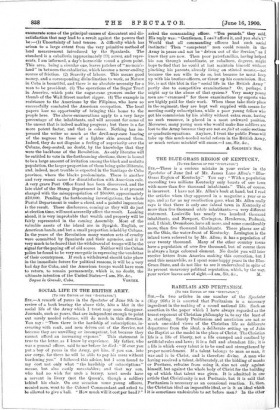SOCIAL LIFE IN THE BRITISH ARMY.
[TO THE EDITOR OF THE "SPECTATOR.") SIR,—A remark of yours in the Spectator of June 9th in a review of a book bearing the above title, hits a blot in the social life of the Army which I trust may soon disappear. Journals, such as yours, that are independent enough to point out sorely needed reforms, will do much in this direction. You say : "Then there is the hardship of subscriptions, in- creasing with rank, and men driven out of the Service, not because they are unwilling or incompetent, but because they cannot afford an increasing expense." This statement is true to the letter, as I know by experience. My father, who was a general officer, said to me before he died: "If ever you put a boy of yours in the Army, get him, if you can, into our corps, for there he will be able to pay his mess without burdening you." I followed this advice, but I soon found to my coat not only what "the hardship of subscriptions" means, but also costly mesa-tables; and that my son, who had no wish for such a luxury, must needs have a servant in livery (not the Queen's, though a soldier) behind his chair. On one occasion some young officers, monied men, went to the Colonel Commandant and asked to be allowed to give a ball. "How much will it cost per head ? " asked the commanding officer. "Ten pounds," they said. His reply was: "Gentlemen, I can't afford it, and you sha'n't." Would that all commanding officers had such social instincts ! Then "competent" men could remain in the Army in peace and not be "driven out of the Service," as I know they are now. Then poor paterfamilias, having helped his son through subordinate, or subaltern, degrees, might hope to find that he could at last maintain himself without pinching his parents, already living on stinted means,—not because the son wills to do so, but because he must keep up with his brother-officers, or throw up his commission. But, Sir, is not this blot in the "social life in the British Army" partly due to competitive examinations? Or, perhaps, I might say to the abuse of that system ? Very many young men are " crammed " for these examinations by experts who are highly paid for their work. When these take their place in the regiment, they are kept well supplied with means for meeting costly subscriptions, while a poor young fellow who got his commission by his ability without extra cram, having no such resource, is placed in a most awkward position. Moreover, many young men who would make fine soldiers are lost to the Army because they are not au fait at conic sections or quadratic equations. Anyhow, I trust the public Press will take up this much-needed social reform in the British Army, or much serious mischief will ensue.—I am, Sir, &c., A SOLDIER'S SON.






































 Previous page
Previous page